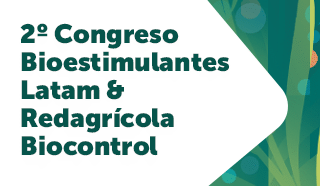10/Mar/2022
#03
SUBSCRIBE TO OUR NEWSLETTER
Suscríbete a nuestro newsletter
Last issue articles
- Biome: the space gaining protagonism in biological strategies for crops
- The export dynamics driving the Mexican biologicals market
- New model developed to evaluate effects of two or more biostimulants combined in a single crop
- Dr. Wagner Bettiol and the biocontrol market in Brazil
- Las propiedades que hacen del Trichoderma un socio clave en la búsqueda de mejores desempeños en los cultivos
- Changes in the new regulation on fertilizers and biostimulants in Chile
- Innovak Global, the expansion of root specialists
Market movers
- Renewable-based nitrogen fertilizer firm raises US$ 20 million in investment round
- Bayer and Ginkgo Bioworks close agreement to strengthen open innovation platform for agricultural biologics
- Argentinean firm Puna Bio: Millions raised to study superbacteria for agricultural use
- Corteva Agriscience signed an agreement to acquire leading biologics company Symborg
- Brazilian study uncovers ants' potential in crop protection
- Huber acquires specialty plant nutrition producer Biolchim
- UPL announces agreement to distribute bioprotector based on orange oil
- ICL and Lavie Bio start strategic collaboration to develop new biostimulants
- Hortitool and Green Smile to organize the Morocco Berry Conference 2022
Scientists From Southern Chile Develop Biopesticide From The Lupine Legume
The lupine, a legume of South American origin cultivated mainly in the Chilean Araucanía region, could now help control pests. This is due to the fact that scientists from the Center for Agroacuícola Nutritional Genomics (CGNA), in the southern city of Temuco, have developed a natural biopesticide against pests and diseases from this legume.
It is a biopesticide based on specific combinations and concentrations of lupine alkaloid molecules, that "when formulated and applied to different crops, replicates the natural effect of pest repellency," explains Haroldo Salvo-Garrido, doctor in genomics and scientific director of the CGNA.
After two years of research, it was possible to test the effect of these molecules against crop pests. These alkaloids in Lupines luteus are synthesized in the leaves and transported to other organs for storage, such as the epidermal and subepidermal tissue of leaves, stems, and mainly seeds.
Thus, “they serve the lupine as a defense against pests, microorganisms, pathogens and herbivores, showing a wide range of biological activity. They can inhibit the multiplication of viruses, the proliferation of bacteria and the growth of certain fungi”, confirmed the specialist.
"Although this investigation is soon to be concluded, the repellent properties of the lupine biopesticide against important pests have already been confirmed," added the expert.
Additional research on aphids in horticultural species and some important bacteria for exported fruit will soon be completed.
Likewise, "a semi-industrial processing technology was developed, which takes the process to a commercial scale, efficiently extracting the alkaloid molecules so as not to alter their properties," commented Dr. Salvo-Garrido.
Last issue articles
- Biome: the space gaining protagonism in biological strategies for crops
- The export dynamics driving the Mexican biologicals market
- New model developed to evaluate effects of two or more biostimulants combined in a single crop
- Dr. Wagner Bettiol and the biocontrol market in Brazil
- Las propiedades que hacen del Trichoderma un socio clave en la búsqueda de mejores desempeños en los cultivos
- Changes in the new regulation on fertilizers and biostimulants in Chile
- nnovak Global, la expansión de los especialistas en la raíz
Market movers
- Argentinean firm Puna Bio: Millions raised to study superbacteria for agricultural use
- Corteva Agriscience signed an agreement to acquire leading biologics company Symborg
- Brazilian study uncovers ants' potential in crop protection
- Huber acquires specialty plant nutrition producer Biolchim
- UPL announces agreement to distribute bioprotector based on orange oil
- ICL and Lavie Bio start strategic collaboration to develop new biostimulants
- Hortitool and Green Smile to organize the Morocco Berry Conference 2022
About us
Biologicals Latam es una revista digital de Redagrícola que informa de manera especializada sobre la intensa actividad que se está desarrollando en el espacio de los bioinsumos para la producción agrícola. Esta publicación es complemento del Curso Online de Bioestimulantes y Biocontrol y las conferencias que este grupo de medios realiza en torno al tema.



